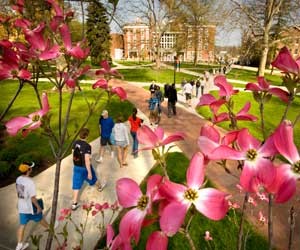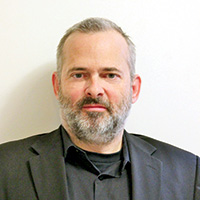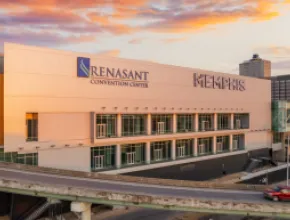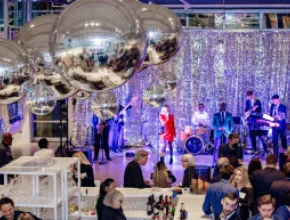Pennsylvania’s esteem in higher education was predestined by namesake founder William Penn. Even before King Charles II granted him forested "Sylvania" in 1681, Penn envisioned the prominence of education in the future state’s development. Another Pennsylvania champion, Benjamin Franklin, named "the good education of youth" as "the surest foundation of happiness."
Upon such founding keystones, the Pennsylvanian campus grew in renown through the centuries. Today, the state counts well over 500 private and public colleges and universities, many of which, along with academic excellence, share the distinction of longevity. The University of Pittsburgh (Pitt) began as a one-room log cabin in 1787, while the University of Pennsylvania (Penn), conceived by Franklin, dates to 1740.
Groups have much to gain from this statewide network of ideas and learning. From conferences to summer camps, Pennsylvania’s colleges and universities enrich and elevate the mind.
Eastern Pennsylvania
Philadelphia is replete with American originals, and education is no exception. Hometown Ivy Leaguer Penn (www.upenn.edu) introduced the nation’s first medical school, collegiate business school, journalism program, university teaching hospital and modern liberal arts curriculum. The university also has first-rate conference services, with multipurpose venues ranging from historic Houston Hall to Franklin Field, the country’s oldest two-tiered stadium.
At adjacent Drexel University (www.drexel.edu), the Drexel Conference Center offers 4,300 square feet of new or newly renovated meeting space across several proximate Center City locations, overnight accommodations included. The center is within walking distance of 30th Street Station.
"It is the ideal meeting location within a city with a rich cultural and historical heritage," says Rita LaRue Gollotti, senior associate vice president for Drexel business services.
Spaces include the University Club, offering cityscape views and a rooftop patio, and the newly opened Millennium Hall, with space for 70, including six breakout rooms. As part of its continuing expansion, which includes the new Recreation Center, Drexel is exploring plans for a mixed-use building that would include a hotel and meeting space.
Dating to 1884, Temple University (www.temple.edu) in North Philadelphia celebrates the reopening this spring of its Baptist Temple, a circa-1891 landmark that was repurposed as an event venue.
"It provides a new location for meetings, social gatherings, programs and conferences," says Charles Bethea, executive director.
Other Temple University conference facilities, available from May to August with on-campus lodging, include the Liacouras Center and the Tuttleman Learning Center.
Founded in 1842, Villanova University (www.villanova.edu) occupies 255 scenic acres in the historic "Main Line" suburbs near Valley Forge.
"For meetings with an educational focus, our built-in classroom media technology and teaching-learning facilities are outstanding in their quality and value," says Ronald Diment, Villanova’s director of conference services. "We offer planners one-stop-shop convenience by arranging everything from housing to award-wining dining services."
Accommodating groups of up to 650 in the Connelly Center and as many as 12,000 in Villanova Stadium, the school is well equipped for midsize and large-scale gatherings. Situated on a beautiful wooded estate, the charming 58-room Villanova Conference Center specializes in executive meetings and training.
Also close to Philadelphia is Haverford College (www.haverford.edu), offering a summertime-only program. With spaces ranging from classrooms to the reception-ready Great Hall, the liberal arts school also features sports fields and a new athletic facility.
"We provide facilities for events ranging from academic conferences to wedding receptions," says Dorothy Labe, director of summer programs.
Other Philadelphia area schools supporting conferences and events include Chester-based Widener University (www.widener.edu) and the distinguished all-women Bryn Mawr College (www.brynmawr.edu).
Farther away in Bethlehem, top-tier Lehigh University (www.lehigh.edu), founded in 1865, has an eclectic group offering. The event-friendly Zoellner Arts Center houses three theaters, including the 946-seat Baker Hall, while the Stabler Observation Tower offers space overlooking the Lehigh Valley. Sports are a big play, too; the Philadelphia Eagles run their summer camp at Goodman Stadium.
"From intimate gatherings to concerts at our 6,000-seat Stabler Arena, Lehigh University can flexibly support many different types of events," says Travis Spencer, director of business development. "With over 30 years of service, our conscientious staff will ensure a great experience."
In nearby Allentown, Muhlenberg College (www.muhlenberg.edu) is another venerable Lehigh Valley institution. Dating to 1848, this private liberal arts school offers a variety of group spaces, such as the Great Hall in the Seegers Union and the Miller Forum. In addition to on-site media services and full-service catering, the college offers a distinct advantage to planners: access to four different dining locations across campus, serving everything from subs to stir-fry to sushi.
"Rather than locking food choices into a specific menu, we offer a range of options," says Christine Lake of the campus events office.
Central Pennsylvania
From its central geographical location, Penn State (www.psu.edu), chartered in 1855, has unprecedented influence across the state. With 24 locations statewide, Penn State is within reach of virtually every Pennsylvanian.
The State College campus is a major conference magnet, with the 300-room planner favorite Penn Stater Conference Center Hotel serving as the area’s largest conference destination. Featuring 49 meeting and banquet spaces totaling 58,000 square feet of flexible space, this sophisticated facility is internationally renowned for its superior service. Attractive, too, is the historic 223-room Nittany Lion Hotel, with elegant spaces such as the Board Room and the Faculty Staff Club.
Other venues include the Bryce Jordan Center and Center for the Performing Arts, while ice cream stops at Penn State’s famed Berkey Creamery, supplied in part by the university’s own cows, are essential. For brain food, visit www.experts.psu.edu for a list of conference-ready faculty speakers.
In rural Lewisburg, top-ranked liberal arts institution Bucknell University (www.bucknell.edu), founded in 1846, offers a variety of facilities in an educational and professional atmosphere. Notable venues include the 1,200-seat Weis Center for the Performing Arts, with exceptional acoustics; Rooke Chapel, seating 850 people; and the off-campus Forrest Brown Conference Center, set in a wooded area with a ropes-climbing course.
"Other distinctive assets include the Samek Art Gallery, the Stadler Center for Poetry and the Kinney Natatorium, featuring an Olympic-size pool," says Judy Mickanis, executive director of events management. "Each summer nearly 5,000 visitors participate in about 40 conferences, while during the year, we host numerous weddings and community gatherings."
For scenic retreats, Susquehanna University (www.susqu.edu), set on a lush, 306-acre campus in nearby Selinsgrove, has lecture halls and seminar-style classrooms for gatherings during academic year breaks and the summer. Other assets include 22 air-conditioned residence halls, athletic facilities and three performance spaces, including the 1,500-seat Weber Auditorium, home to one of the East Coast’s largest revolving stages.
"Our unique blend of pastoral surroundings and contemporary facilities make your stay rewarding and productive," says Christine Jaegers, director of conference and event management.
Surrounded by Gettysburg National Military Park, Gettysburg College (www.gettysburg.edu), founded in 1832, hosts conferences, camps and special events over a 10-week period in the summer. Ranging from the splendidly restored Majestic Theater to conference programming such as the renowned Gettysburg Leadership Experience, the college’s robust group offering includes sponsorship of notable annual gatherings such as the Civil War Institute Conference, the Mason Dixon Jazz Camp, and the Pennsylvania State Educators Association’s Annual Leadership Conference, a fixture for the past 30 years.
"We offer a variety of unique facilities and top-notch services to meet all of your event needs," says Margaret Baldwin, facilities manager.
In Pennsylvania’s capital, Harrisburg University of Science and Technology (www.harrisburgu.edu) was established in 2001 to address Central Pennsylvania’s need for increased study and career opportunities in science, technology, engineering and math. Opened in 2008, the university’s $73 million, 16-story Academic Center is a remarkable high-tech facility anchoring a complex that includes 371,000 square feet of classroom space, science labs and meeting rooms. Integrated with the full-service Harrisburg Hilton, an IMAX theatre and a food court, the center also features the state-of-the-art Select Medical Conference Center on the 14th floor, including a 40-foot boardroom table and a 125-seat auditorium.
"Our facilities are on par with major centers such as New York and Los Angeles, including first-rate global videoconferencing capabilities," says Ryan Riley, manager of development.
Western Pennsylvania
Founded in 1787 as the Pittsburgh Academy, a log cabin on the edge of the American frontier, the University of Pittsburgh (www.pitt.edu) today is a preeminent global center of learning and research. Located in Oakland, the academic, cultural and healthcare heart of Pittsburgh, the university’s array of venues includes the Petersen Events Center, dramatically overlooking the campus and Pitt’s iconic Cathedral of Learning.
Another Pitt standout is the historic University Club. Featuring 10 meeting rooms, a rooftop terrace and exceptional cuisine, the club is an elegant choice for seminars, lectures, receptions, weddings, award ceremonies and fundraising galas. The university also offers conference services at its satellite campuses in Bradford, Pa., and Johnstown, Pa.
In downtown Pittsburgh, venues at Duquesne University (www.duq.edu) include the distinctive Power Ballroom. Located on the top level of Duquesne’s Power Center, this expansive space, featuring floor-to-ceiling windows and two outdoor decks, is customizable for midsize to large-scale gatherings.
Uniting Carnegie Tech and the Mellon Institute of Science in 1965, Pittsburgh’s Carnegie Mellon University (www.cmu.edu) offers year-round meetings, banquets and conferences for groups of up to 700. With the University Center offering numerous facilities for athletics, assemblies and dining, event support includes a dedicated on-site planner.
"Carnegie Mellon University is a diverse atmosphere for our clientele and is often seen as a great resource for connecting with world-renowned faculty to enhance their program content," says Elizabeth Yazemboski, director of conferences and events. "The opportunity to experience Pittsburgh from the perspective of one of its landmark institutions should not be missed."
On the banks of the Monongahela River in California, Pa., the highly regarded California University of Pennsylvania (www.calu.edu), dating to 1852, accommodates gatherings of up to 600 delegates, ranging from executive strategy sessions to trade shows. Cal U’s conference profile is certain to soar in 2011, when it is scheduled to open its new $54 million Convocation Center. Including a 6,000-seat arena, an Executive Services Conferences Center and food service operation built for banquets of up to 1,000 guests, the state-of-the-art center will be the largest indoor venue between Pittsburgh and Morgantown, W.Va.
"Our on-staff planners can work with any type of group on any type of event to ensure its success—at a cost savings compared to typical meeting venues," says Juanita Timney, executive director of the university’s conference services. "The addition of the Convocation Center will take our offerings to the next level."
West of California, Washington & Jefferson College (www.washjeff.edu), founded in 1781, is one of the nation’s oldest and most distinguished liberal arts colleges. In early 2007, the college established a conference and event department to offer a high-quality experience in a historical college campus setting with all the amenities. It is geared toward organizations looking for an outside venue at an affordable price.
Available for a wide range of gatherings year-round with a summer residential program for visitors and conferees, facilities include the Howard J. Burnett Center, The Technology Center and the Rossin Campus Center.
"We customize each group’s experience," says Terese Fiedler, director of conferences and events. "You will receive personalized attention, and we are quaint enough that our guests become part of our community and friends of the college."
Jeff Heilman is a frequent contributor to Meetings East.







